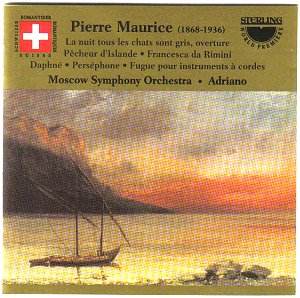Maurice
was born on the shores of Lake Geneva. He studied music in Stuttgart
with Percy Goetschius and settled in Munich for twenty years from
1899. During the Great War he was in charge of music at various
POW camps. In 1919 he returned to Switzerland. There are operettas,
oratorios, song cycles with orchestra, ballets, overtures and
operas in the Maurice worklist.
The
overture to the 1932 operetta La Nuit tous les chats sont
gris is at first a restive playfully flickering reflection
of John Foulds' overture Le Cabaret with brilliant work
for brass and woodwind. Later it yields to ecclesiastical and
then impressionistic musing on the French folksong Au clair
de la lune. A cock-crow summons the Berliozian brilliance
of the opening - a Roman Carnival or Benvenuto Cellini
indeed.
Both
Guy-Ropartz and Maurice were drawn to write music inspired by
Pierre Lôti's Pêcheur d'Islande. Maurice's
four episodes make an early impressionistic suite. The introspection
of Sur La Mer d'Islande is reminiscent of the Bachian devotions
of Saint-Saëns' prelude to La Déluge with an
insistent figure that might well have stuck in the memory of Mario
Nascimbene when he wrote the main theme for the film, The Vikings.
After grim intimations come bucolic themes with much cheery work
for the woodwind. I am not sure that such stark contrasts work
well. The mellow slow wash of Propos d'amour is much more
successful with its sustained sunset glow. L'attente sur la
falaise (keeping watch from the coast) glows and glowers rather
than howls. If this atmospheric suite has a weakness it is its
emphasis on mood over drama. It does however go to show that Maurice
was a composer of sensitive integrity.
Almost
a quarter of a century after Tchaikovsky's overwhelming Francesca
da Rimini, Pierre Maurice wrote his own 'symphonic poem after
Dante'. This is a work potently eloquent in its depiction of mood.
It has some well-spun love music which has Tchaikovskian resonance
(6.34) and, as Adriano's notes suggest, it is also a burnished
invocation to darkness. It is of a type that we find in the gloomy
prelude to Bernard Herrmann's music for Citizen Kane as
the camera tracks through the ruined dreams of Xanadu.
After
the Daphné Prelude, with its Hansonian theme and
faintly impressionistic treatment, comes the latest work in this
collection; another piece inspired by Greek legend. Perséphone
is strangely Straussian in its writing for the horns but then
reverts to type with smoothly undulating themes carrying a suggestion
of George Butterworth when animated and of Delius or Bantock (Pierrot
of the Minute - a work to receive a new recording from Hyperion
later this year, 2003) when reflective. Perhaps early Roussel
(Dans la forêt) and D'Indy (Jour d'été)
would be closer parallels. This is a work of instinctive meandering,
rhapsodic temperament and perhaps occasionally loses the plot.
To compensate there are some revelatory moments such as the murmuring
strings at 7.21. The second movement of Perséphone
takes us back into Herrmann territory. Who knows, Bernard Herrmann
might have given Maurice an outing or two during his incredibly
varied NBC studio broadcasts in the 1930s. This is also the sort
of music that would have appealed to Constant Lambert and still
more to Sir Thomas Beecham. Relief from the gloom of Perséphone's
enforced exile to Hades comes at 5.43 in the second of the two
movements.
The
Fugue for strings is well-rounded, almost voluptuous, and
certainly defies the academic dust that normally settles on such
creations.
Not
desperately compelling music but surely there is room in the world
for such sincere romantic-impressionist creativity.
Rob
Barnett
see
also review by Michael
Cookson
